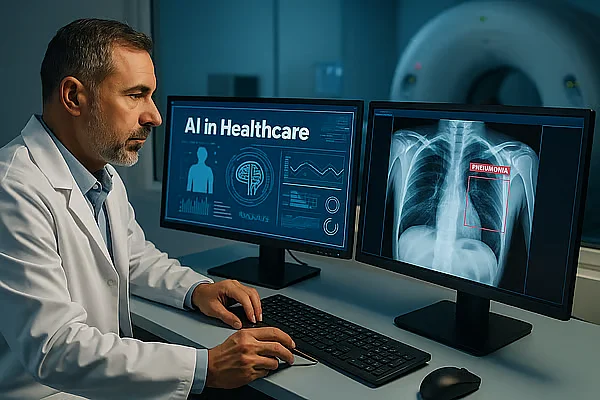
How AI Helps UAE Doctors Predict Heart Disease, Diabetes, Fertility Risks Early
Doctors in the UAE are exploring how AI, genetic data, and predictive health tools can help identify serious conditions, such as heart attacks, diabetes complications, and fertility issues, years before patients exhibit symptoms. The approach, experts say, has the potential to save lives, but also raises ethical and structural challenges.
At the“Diagnosing Before Symptoms” session, part of the 5th Future of Healthcare Summit 2025 organised by Khaleej Times, Dr Samer Ellahham, Medical Director at Cleveland Clinic, compared the quality of data in predictive medicine to making popcorn.“If the data isn't good, no matter how sophisticated the algorithm, the result is useless,” he said.“You can't make a good snack out of burnt kernels.”
Recommended For YouHe stressed that predictive healthcare requires a shift from physician- or admin-focused systems to caregiver-centred models. Sensors, continuous monitoring, and electronic health records must be integrated from the start to provide actionable insights.
Stay up to date with the latest news. Follow KT on WhatsApp Channels.
For example, Dr Ellahham noted, wearable devices and biometric tracking can alert clinicians to early warning signs of heart disease or diabetes, allowing interventions before hospitalisation becomes necessary.“It's about moving from reactive care to preventive action,” he said.
Dr Ihsan Almarzooqi, Co-Founder of Metabolic, described how predictive technologies are already changing diabetes care. Computational coronary calcium scoring, which traditionally requires an expensive CT scan, can now be done via retinal scans for diabetics, shifting testing to the beginning of the care pathway.
“We've implemented this for about a year, and it provides early insights without invasive procedures,” he said, highlighting both patient benefit and cost efficiency.
Predictive tools are also making an impact in reproductive medicine. Dr Partha Das, Medical Director at Orchid Fertility, shared a story about a couple who discovered genetic risks for their future children. The news sparked distress and raised ethical dilemmas, highlighting the limitations of predictive testing.
“These tests can save lives or prevent serious conditions, but they can also create complex ethical situations when families act on genetic predictions,” he said. Dr Das emphasised counselling and informed decision-making as critical parts of using these tools responsibly.
Despite the promise, all speakers agreed that adoption remains slow. Current insurance models, clinician resistance, and outdated guidelines often prevent preventive tools from being fully utilised.“As long as reimbursement favours hospitalisations over prevention, these technologies will remain underutilised,” Dr Ellahham said.
Experts also noted the importance of integrating predictive tools with patient-centred care. AI, genetic testing, wearables, and continuous monitoring can empower both doctors and patients, but only if systems, regulations, and reimbursement models evolve in parallel.
The event under the theme“Echoes of Tomorrow | Building the Future of Care.” brought together senior leaders from public and private healthcare institutions across the region to examine how innovation, technology, and collaboration are reshaping patient care, with a special focus on AI, predictive health, and preventive medicine.

Legal Disclaimer:
MENAFN provides the
information “as is” without warranty of any kind. We do not accept
any responsibility or liability for the accuracy, content, images,
videos, licenses, completeness, legality, or reliability of the information
contained in this article. If you have any complaints or copyright
issues related to this article, kindly contact the provider above.
Most popular stories
Market Research

- Pepeto Presale Exceeds $6.93 Million Staking And Exchange Demo Released
- Citadel Launches Suiball, The First Sui-Native Hardware Wallet
- Luminadata Unveils GAAP & SOX-Trained AI Agents Achieving 99.8% Reconciliation Accuracy
- Tradesta Becomes The First Perpetuals Exchange To Launch Equities On Avalanche
- Thinkmarkets Adds Synthetic Indices To Its Product Offering
- Edgen Launches Multi‐Agent Intelligence Upgrade To Unify Crypto And Equity Analysis



















Comments
No comment